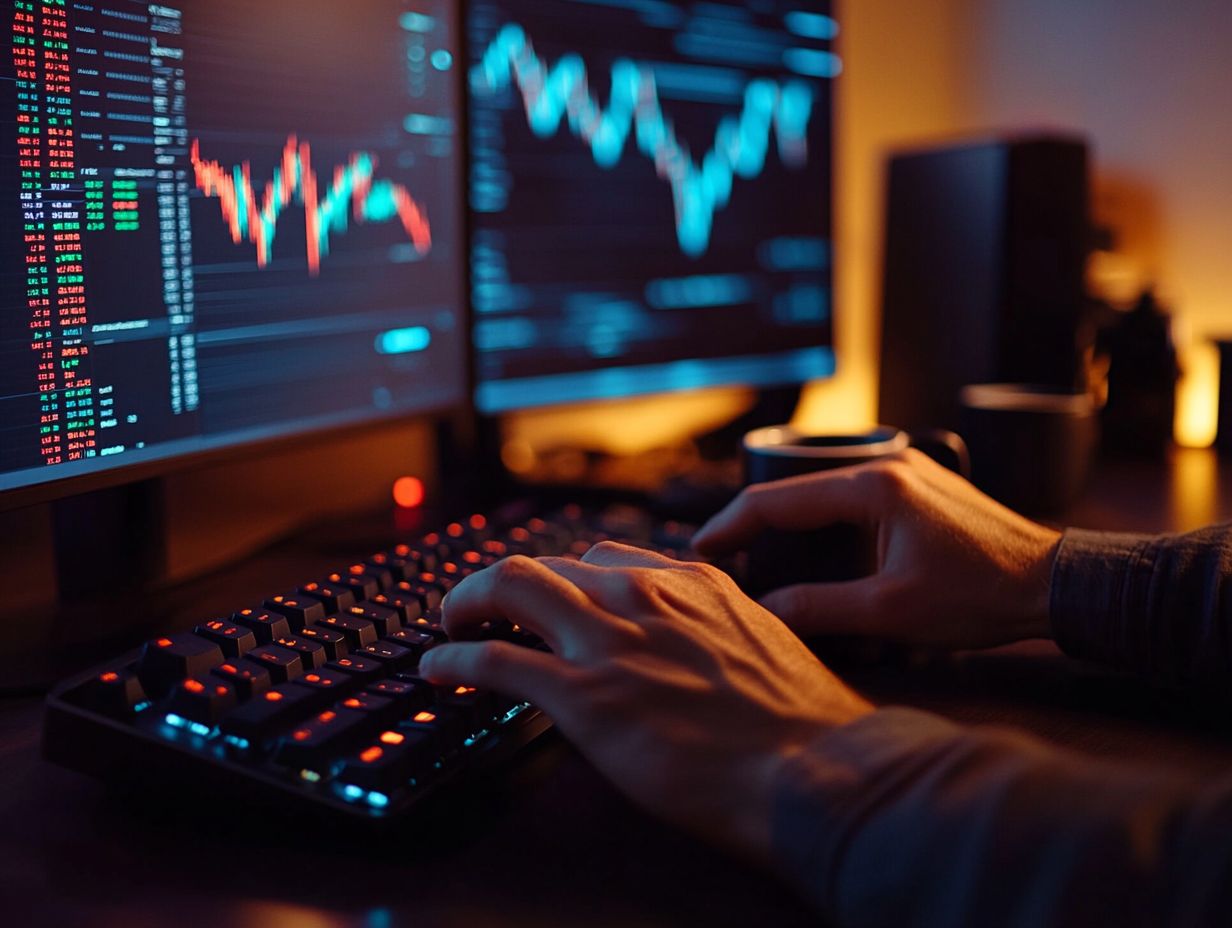The Connection Between Trading and Emotional Health
In the fast-paced realm of trading, your emotional health is pivotal in shaping your success. You often find yourself facing high-stakes decisions where emotions such as fear and greed can obscure your judgment, leading to costly missteps.
This article delves into the mind-body connection, highlighting how your emotions directly influence your trading performance. You ll uncover common emotional traps that traders fall into, along with practical strategies to manage these feelings. It also covers self-care practices and offers guidance on when to seek professional assistance, ensuring you maintain emotional well-being as you navigate the complexities of the markets.
Contents
- Key Takeaways:
- The Importance of Emotional Health in Trading
- The Impact of Emotions on Trading Performance
- How to Manage Emotions in Trading
- The Role of Mindfulness in Trading
- Maintaining Emotional Health While Trading
- Seeking Professional Help
- Frequently Asked Questions
- What is the connection between trading and emotional health?
- How does trading affect emotional health?
- Can trading have a positive impact on emotional health?
- What are common emotional challenges faced by traders?
- How can traders maintain good emotional health while trading?
- What is the role of emotional intelligence in trading?
Key Takeaways:

- Emotional health is crucial in trading, as emotions can greatly impact trading performance.
- Common emotional traps in trading include fear, greed, and overconfidence.
- Practicing strategies for emotion regulation and incorporating mindfulness can help traders maintain their emotional health.
The Importance of Emotional Health in Trading
Emotional health is crucial in trading. Neglecting your emotional health can lead to poor choices that profoundly impact your trading psychology. Understanding the relationship between trading and emotions is essential, as it shapes your investment decisions and ultimately determines your trading performance.
The emotional aspect of trading can erect barriers, prompting impulsive actions driven by fear and greed. As you navigate the unpredictable waters of financial markets, recognizing the significance of maintaining emotional balance is essential for attaining your trading success.
Understanding the Mind-Body Connection
The mind-body connection is essential in trading, influencing not only your emotional responses but also the decision-making processes critical for your success. This intricate relationship shapes how you react to market fluctuations and make pivotal choices.
When volatility strikes, your emotional state is often intertwined with your financial outcomes. Thinking errors, such as herd behavior, can amplify this connection, tempting you to follow the crowd instead of trusting your own analyses.
Moreover, these thinking errors can muddle your judgment, leading you to overestimate your ability to forecast market trends. Recognizing these emotional responses and understanding their implications are crucial steps in cultivating a disciplined trading mindset.
The Impact of Emotions on Trading Performance
Emotions play a pivotal role in your trading performance, often influencing the effectiveness of your decisions amid market volatility and psychological missteps. Recognizing this can significantly enhance your approach, allowing you to navigate the complexities of trading with greater clarity and precision.
Common Emotional Traps in Trading
Traders often find themselves ensnared in emotional traps that can derail their carefully crafted strategies, with the fear of loss and the greed for gains standing out as the most prevalent pitfalls. These emotional responses foster an environment where irrational decisions flourish, often resulting in avoidable losses.
For instance, the tendency to hold onto losing trades in hopes they’ll recover may compel you to cling to a losing position far longer than warranted, all while harboring the misguided belief that a rebound is just around the corner. Conversely, overconfidence bias can push you into excessive risk-taking, fueled by a belief that you possess a unique insight into the market.
Recognizing these biases is vital act now to protect your trading success! Create a structured trading plan with predefined entry and exit points to outsmart your emotional traps and foster a disciplined approach that is anchored in logic rather than emotion.
How to Manage Emotions in Trading

Effectively managing your emotions in trading is essential for preserving discipline and making emotional regulation a core component of your trading strategy. By prioritizing this aspect, you can enhance your decision-making and navigate the complexities of the market with greater confidence.
Practical Strategies for Emotion Regulation
Practical strategies for emotion regulation empower you to maintain self-awareness and stick to your trading strategies, even when the pressure is on.
Incorporating techniques like journaling allows you to reflect on your daily trading decisions and emotions. This practice helps you uncover patterns that might influence your choices.
Regular breathing exercises can also be a game-changer. They alleviate anxiety and enable you to regain focus and clarity in your decision-making.
Setting clear trading goals acts as your personal roadmap. It guides your actions toward your desired outcomes. When you pair these strategies with solid risk management strategies such as setting stop-loss levels or diversifying your portfolio you not only enhance your emotional control but also significantly boost your overall trading performance.
The Role of Mindfulness in Trading
Mindfulness in trading acts as an invaluable asset, elevating your emotional awareness and empowering you to deftly navigate common thinking errors. These are errors in reasoning that can lead to poor decisions.
Mindfulness sharpens your focus. It enhances your decision-making skills, allowing you to engage with the markets more effectively and confidently.
Benefits of Mindfulness for Traders
The benefits of mindfulness for you as a trader extend far beyond just managing your emotions; it cultivates a deeper sense of trading discipline and enhances your overall mental well-being.
Mindfulness boosts your focus and concentration. It helps you make informed decisions in the complex financial markets.
As you develop a greater awareness of your thoughts and feelings, you can effectively reduce the stress that often comes with sudden market shifts.
This decrease in stress doesn t just enhance your psychological health; it also aligns perfectly with behavioral finance principles, which emphasize the importance of mental clarity in trading performance.
Ultimately, by incorporating mindfulness practices into your daily routine, you not only enhance your emotional resilience but also elevate your effectiveness in executing trades, paving the way for more sustainable financial success.
Maintaining Emotional Health While Trading
Maintaining emotional health during trading is crucial for preventing trading addiction and cultivating the mental resilience necessary for achieving consistent success in the financial markets. Understanding the link between self-awareness and trading success can further enhance your approach.
Self-Care Practices for Traders

Incorporating self-care practices into your trading routine can dramatically enhance your mental health and emotional well-being, ultimately elevating your trading performance.
By prioritizing regular exercise, you can boost your endorphin levels and reduce stress. This cultivates a more balanced mindset that keeps you sharp during market fluctuations.
Healthy eating habits are equally vital. Fueling your body with nutritious foods can significantly enhance your cognitive function and focus, ensuring you re at your best during those crucial trading sessions.
Moreover, maintaining a solid support network of fellow traders or trusted friends provides you with emotional stability and fosters accountability. Together, these elements encourage better emotional regulation and sharper decision-making, empowering you to navigate the complexities of the market with increased confidence and resilience.
Seeking Professional Help
If you’re struggling with emotional challenges, seeking professional help can be a game-changer! It provides essential support through therapy or counseling. Engaging with a qualified professional can help you navigate the complexities of your emotional landscape, ensuring that you maintain both mental well-being and trading performance.
Don’t wait until stress impacts your trading reach out for support today!
When to Consider Therapy or Counseling
Consider therapy or counseling if emotional challenges, like trading addiction or other mental health issues, affect your trading performance.
Look for signs such as chronic stress, anxiety, or impulsive trading behaviors. These can cloud your judgment and lead to poor decisions.
Engaging in therapy provides valuable tools to manage emotions better. This approach helps you develop a healthier mindset.
With therapy, you can strengthen your trading discipline and create a structured approach to investments. Navigating emotional ups and downs can improve your overall trading results.
Frequently Asked Questions
What is the connection between trading and emotional health?
This connection refers to how trading can affect your mental and emotional well-being.
How does trading affect emotional health?

Trading involves risk and uncertainty, leading to stress, anxiety, and other emotions.
Can trading have a positive impact on emotional health?
Yes! Trading can boost emotional health by fostering discipline, patience, and emotional management.
What are common emotional challenges faced by traders?
Traders often experience fear of failure, fear of missing out, impatience, and greed.
How can traders maintain good emotional health while trading?
Maintain good emotional health by having a trading plan, managing risk, practicing self-care, and seeking support from a mentor or therapist.
What is the role of emotional intelligence in trading?
Emotional intelligence helps you understand and manage emotions, aiding in rational decision-making and reducing impulsive actions.
Don’t wait; take the first step toward a healthier trading mindset today!






